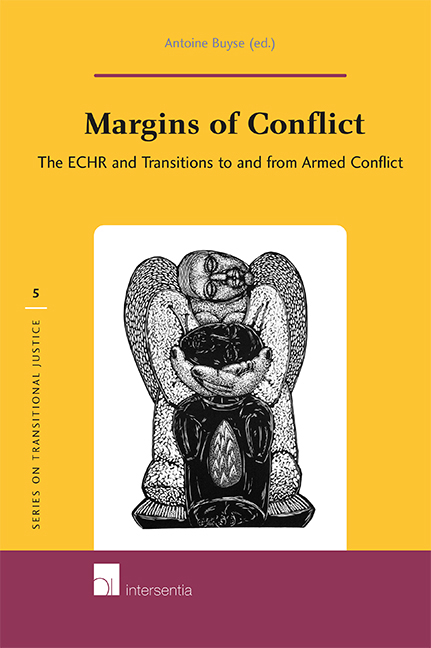Book contents
- Frontmatter
- Preface
- Contents
- Human Rights without Peace? The European Court of Human Rights and Conflicts Between High Contracting Parties
- Crisis Situations, Counter Terrorism and Derogation from the European Convention of Human Rights. A Threat Analysis
- Really Out of Sight? Issues of Jurisdiction and Control in Situations of Armed Conflict under the ECHR
- The Use of Interim Measures Issued by the European Court of Human Rights in Times of War or Internal Conflict
- Foretelling the future, facing the past. Hate speech and conflict situations under the ECHR
- The Duty to Take Preventive Operational Measures. An Adequate Legal Tool to Hold States Responsible in Enforced Disappearance Cases?
- Airborne or Bound to Crash? The Rise of Pilot Judgments and Their Appeal as a Tool to Deal with the Aftermath of Conflict
The Use of Interim Measures Issued by the European Court of Human Rights in Times of War or Internal Conflict
Published online by Cambridge University Press: 16 December 2020
- Frontmatter
- Preface
- Contents
- Human Rights without Peace? The European Court of Human Rights and Conflicts Between High Contracting Parties
- Crisis Situations, Counter Terrorism and Derogation from the European Convention of Human Rights. A Threat Analysis
- Really Out of Sight? Issues of Jurisdiction and Control in Situations of Armed Conflict under the ECHR
- The Use of Interim Measures Issued by the European Court of Human Rights in Times of War or Internal Conflict
- Foretelling the future, facing the past. Hate speech and conflict situations under the ECHR
- The Duty to Take Preventive Operational Measures. An Adequate Legal Tool to Hold States Responsible in Enforced Disappearance Cases?
- Airborne or Bound to Crash? The Rise of Pilot Judgments and Their Appeal as a Tool to Deal with the Aftermath of Conflict
Summary
INTRODUCTION
The 50th birthday of the European Court of Human Rights in 2009 was of course a time for celebration, but at the same time, and perhaps most importantly, a time for reflection. This reflection is not just called for in relation to the general functioning of the Court and its future as a whole, but also in relation to one of its ‘daily working tools’, the possibility for the Court to issue so-called ‘interim measures’ or ‘provisional measures’ during its proceedings. These days, ‘provisional measures’ or ‘interim measures’ are a key instrument for international bodies, such as the Inter-American Court of Human Rights or the European Court of Human Rights, to prevent irreparable harm to persons who are in a situation of extreme gravity and urgency. They result generally in some protection offered by the respondent State to the beneficiaries of the requests, in compliance with an order issued by the Court, which may act at the request of a party or on its own motion. In the European system, the interim measures are not regulated in the European Convention itself, but exclusively in the Rules of the European Court:
‘The Chamber or, where appropriate, its President may, at the request of a party or of any other person concerned, or of its own motion, indicate to the parties any interim measure which it considers should be adopted in the interests of the parties or of the proper conduct of the proceedings before it’ (Rule 39(1) Rules of Court).
In Article 39(2) of the Rules of Court it is stated: ‘Notice of these measures shall be given to the Committee of Ministers.’ The Committee of Ministers of the Council of Europe is indeed kept informed of the interim measures in light of its competence to supervise their implementation. Finally Article 39(3) states: ‘The Chamber may request information from the parties on any matter connected with the implementation of any interim measure it has indicated.’ The Chamber has indeed done so on many occasions. The Rules of Court are supplemented by a Practice Direction on provisional measures, issued by the President of the European Court, in which useful guidance is given with regard to the procedure to be followed when requesting such measures.
- Type
- Chapter
- Information
- Margins of ConflictThe ECHR and Transitions to and from Armed Conflict, pp. 77 - 130Publisher: IntersentiaPrint publication year: 2010

